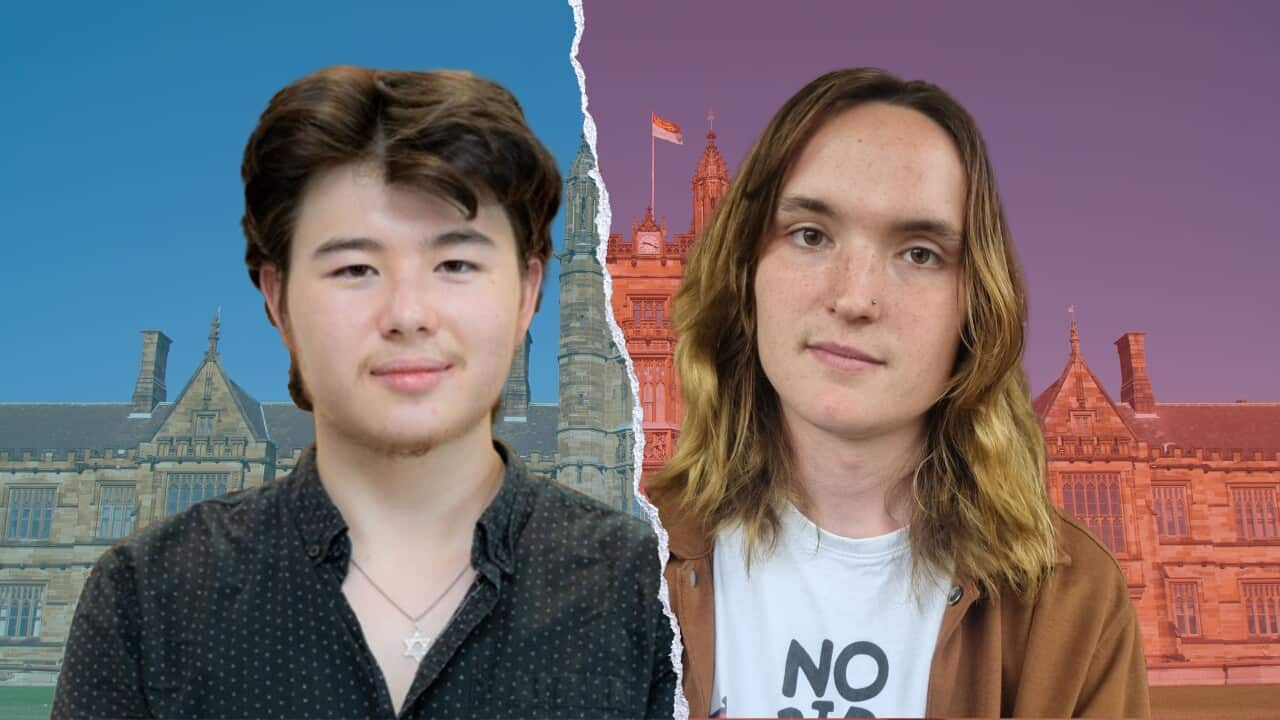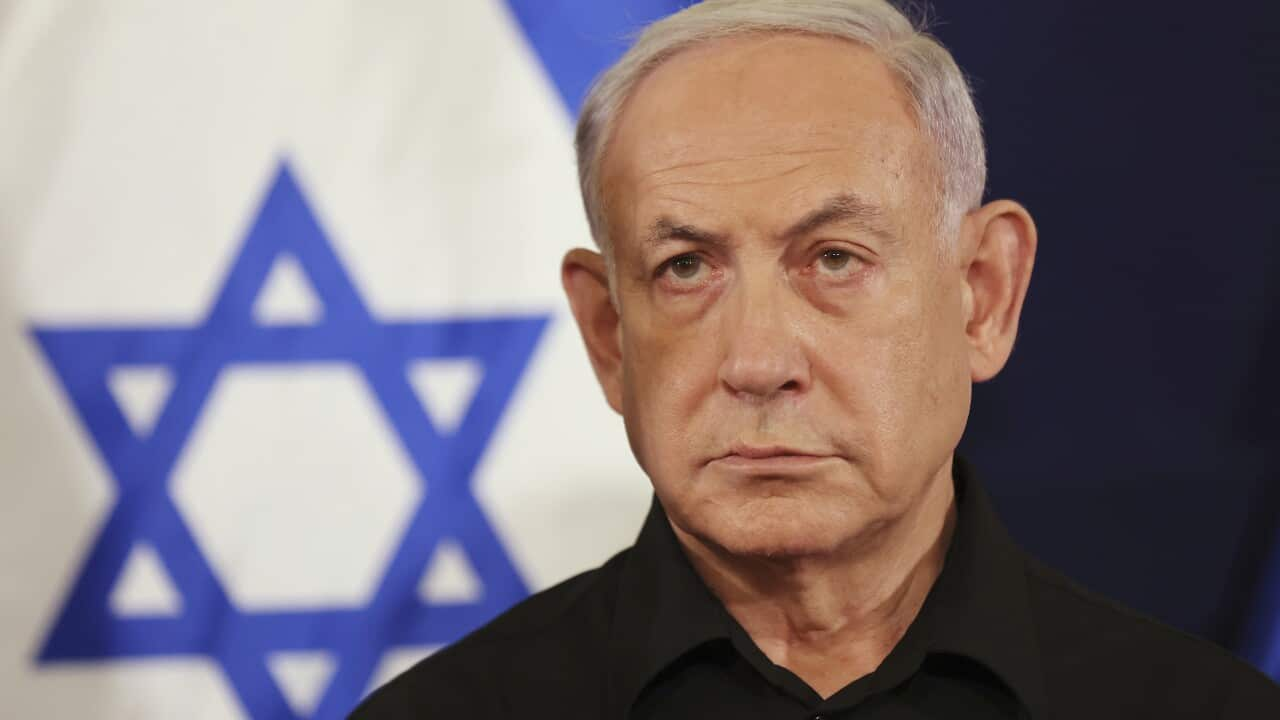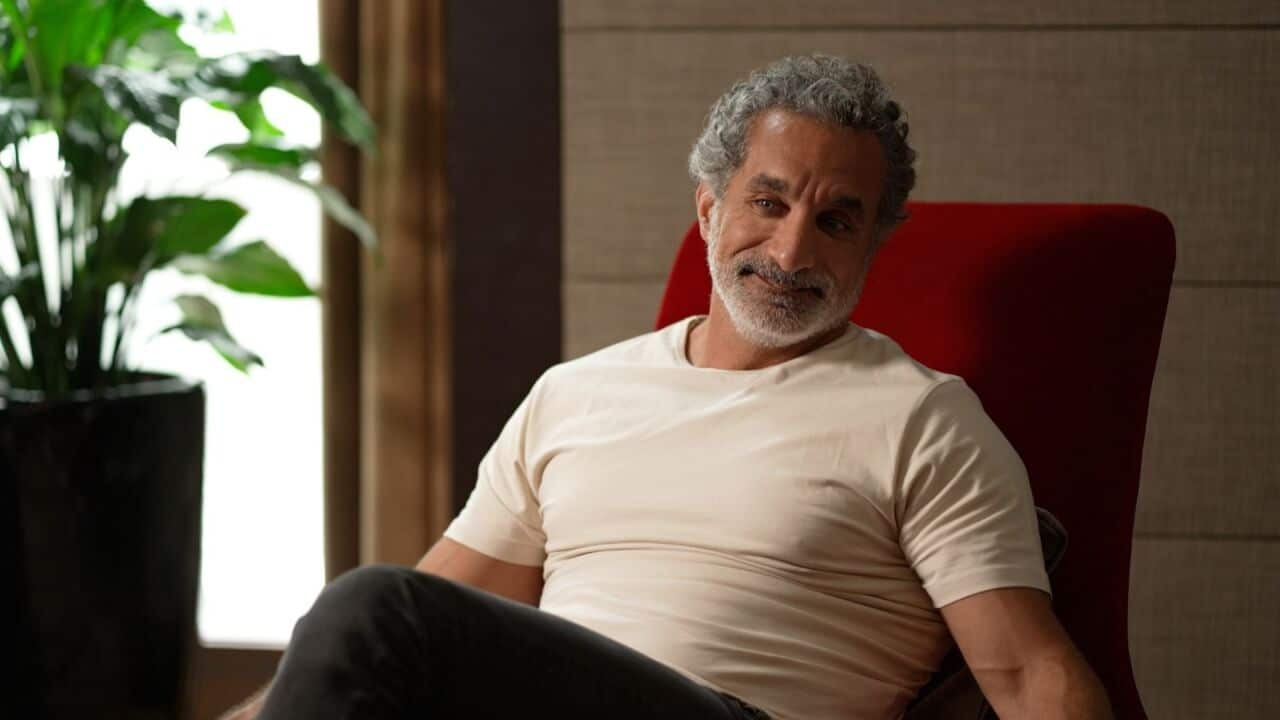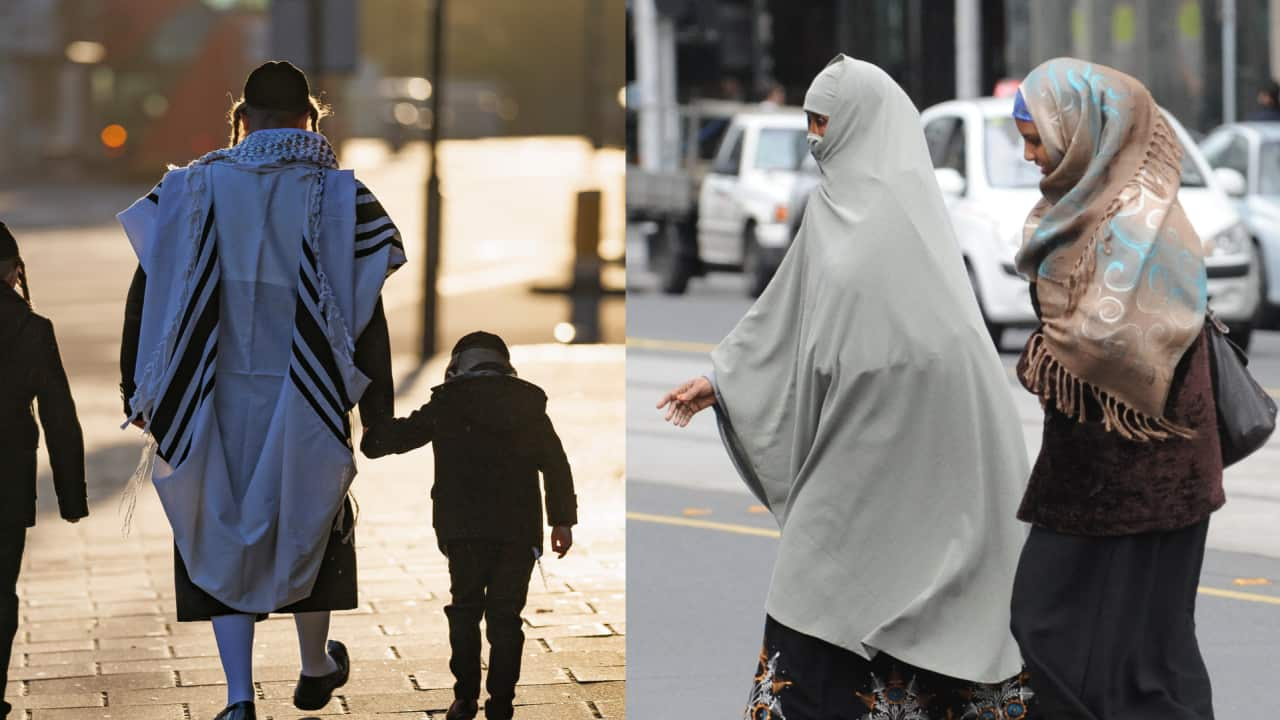Fresh debate over freedom of speech at universities is raging at the University of Sydney, with many students and staff unhappy with the institution’s response to the Hamas-Israel war.
Some believe pro-Palestinian views are being silenced, while supporters of Israel say the university is not doing enough to protect them from antisemitism.
Things came to a head when the university banned a pro-Palestinian student meeting this month.
Student Maeve Larkins is a member of the self-described socialist group, Solidarity Students, that organised the meeting. She said the ban came as a shock to students.
“They go to uni expecting this to be a place where, if nowhere else, radical ideas can be discussed,” she told The Feed.
“It's quite ridiculous, the idea that 30 lefty students in a room talking about politics is … threatening.”

Maeve Larkins is part of the socialist student group that organised the pro-Palestinian event banned by the university. Source: Supplied
At its most severe, misconduct can lead to students being expelled from their course.
“It's a pretty blatant attempt to intimidate students from speaking out,” Larkins said.
Universities: the home of free speech?
Universities have historically been safe havens for controversial ideas. The right to free speech and academic freedom in higher education is enshrined in federal law.
Nick Riemer is a linguistics academic at the University of Sydney and president of its National Tertiary Education Union (NTEU) branch.
“That decision to ban the student meeting was a very serious attack not just on freedom of speech, but on the university's role as a place where critical thought can actually flourish,” he said.
Security presence on campus has ramped up in recent weeks, with security guards and sometimes police showing up to staff forums and student demonstrations.
In emails to staff and students, the University of Sydney said it supported free speech, but stressed it “will not tolerate any pro-terrorist statements or commentary, including support for Hamas’s recent terrorist attacks”.
A spokesperson for the university defended the ban, as posters for the event featured an image of Hamas forces breaking through the Israel-Gaza border and called for a “global intifada”.
Intifada is an Arabic word taken to mean “uprising”, and has been used to describe both nonviolent and violent actions against oppression.
It’s also the term used for what’s broadly known as the First and Second Intifadas, between 1987-1993 and 2000-2005, which were periods of violent unrest in the occupied Palestinian territories. These involved a series of protests, riots and suicide attacks and a strong response from the Israeli military.

Posters advertising the meeting featured images of a bulldozer destroying the Gaza wall and called for a global intifada. Credit: Solidarity Students Sydney Uni
“We believe it could be reasonably imputed from these promotional materials for the meeting that it may be linked to support for terrorist activities,” the University of Sydney spokesperson said.
Larkins accused the university of conflating peaceful pro-Palestinian viewpoints with terrorism.
“‘Uprising' in Arabic has meant many different forms of resistance … it’s taken the form of mass peaceful demonstrations, it's taken the form of attempted strikes,” she said.
Hamas is a Palestinian military and political group that has gained power in the Gaza Strip since winning legislative elections there in 2006.
Its stated aim is to establish a Palestinian state, while refusing to recognise Israel’s right to exist.
Hamas, in its entirety, is designated as a terrorist organisation by countries including Australia, Canada, the UK and the US while New Zealand and Paraguay list only its military wing as a terrorist group.
Other countries voted against a UN resolution condemning Hamas in its entirety as a terrorist organisation.
Larkins also defended using the image of the bulldozer breaking through the fence, which she considers as a symbol of resistance against the occupation of Palestinian territories.
The use of bulldozers to break through the fence between Israel and Gaza was one of a series of methods Hamas used to launch their 7 October attack on Israel, in which more than 1,200 Israelis were killed and over 200 taken hostage, according to Israeli authorities. The attack by Hamas was a significant escalation of a long-standing conflict.
Since the 7 October attack, more than 13,000 people have been killed in Gaza, according to health authorities in the enclave.
“To take that image and to say that the bulldozer knocking down those fences is the violent action - is not a neutral position,” Larkins said.
“You’re saying the violence of occupation is okay, but the violence of resistance to violent occupation is not okay,” she said.
In 2022 a UN commission of inquiry found Israeli occupation of the Palestinian territories to be unlawful. Israel disputes this claim.
Michael Grenier is a student at the university and a member of the Australasian Union of Jewish Students (AUJS), who, alongside Jewish community leaders, lobbied for the event to be banned.

Jewish student Michael Grenier lobbied the University of Sydney to ban the student meeting. Credit: Michael Grenier
“Just because a word can have some [other] meanings, doesn't mean that people aren't scared for their lives,” he said.
Days later, a follow-up event titled Long Live the Intifada was held on campus, which the university did not oppose, despite calls from the AUJS.
Grenier said one pro-Israel student event has been held so far, which involved writing cards to Israeli soldiers. It was disrupted by passers-by yelling “free Palestine” while attendees were praying.

The Australasian Union of Jewish Students held an event on campus that involved writing cards to Israeli soldiers, eating Israeli food and praying. Source: Supplied
“So they're not being censored. They're being relocated.”
University claims neutral stance
Nick Riemer, who said members of his family were killed in the Holocaust, believes the pro-Palestinian side is under intense scrutiny at the university.
“The minute you support Palestinian resistance, you're accused of sympathy for terrorism,” he said.
“There are people on university platforms saying things like, ‘I don't want the violence to end’ … they're from the Zionist camp who are saying that, and no one is cracking down on that kind of open advocacy for continuing violence,” he said.

Nick Riemer is a linguistics academic at the University of Sydney and a longtime Palestinian solidarity advocate.
In an open letter to vice-chancellor Mark Scott, politics professor John Keane alleges the university is showing “an eery bias” in what it considers “pro-terrorist” commentary.
“I’ve never worked in a university whose managers seem so intent on drowning us all in silence,” Keane told The Feed.
The university's spokesperson insists the institution is taking a neutral stance on the conflict.
“As a university, we believe our role is to serve as a forum for debate on wider political issues rather than act as a participant in those debates,” the spokesperson said.
“We strongly support the right of our staff, students and community to express their opinions and political views, including those that some may consider controversial or offensive, as long as it is done in a safe and legal way consistent with our policies and codes of conduct.”
Larkins is concerned there may be a pro-Israel bias amongst the university’s leadership.
She pointed out Chancellor Belinda Hutchinson is a board member of Thales - a French weapons company. Thales is part of a joint venture with one of Israel’s largest defence companies, Elbit Systems, which supplied electronics for separation barriers in Gaza and the West Bank and creates drones and weapons for the Israel Defence Forces (IDF).
Last year, the University of Sydney renewed its longstanding research partnership with Thales – including within the fields of defence and national security.
The Feed does not suggest Hutchinson’s appointment at Thales influences her role at the University of Sydney.

Pro-Palestinian protestors have rallied against Elbit Systems and its subsidiaries around the world. Source: Getty / Martin Pope
“The (university's) Senate has full authority for the affairs of the University and … delegates authority to the Vice-Chancellor who manages the affairs of the University,” the spokesperson said.
“Our Chancellor is deeply respected and has a number of charitable, not-for-profit and other organisations that she supports and transparently declares.”
Other organisations have been under pressure to distance themselves from Elbit Systems. Last month, amid backlash from staff and students, RMIT University revealed it had never proceeded with an intended partnership with the Israeli weapons maker, to develop drones for use in natural disasters.
“RMIT does not design, develop or manufacture weapons or munitions in the university or as part of any partnership,” the university stressed in a statement.
Riemer said there’s a history of staff being disciplined for expressing anti-Israel views at the University of Sydney – and he’s concerned it could happen again.
Academic Tim Anderson was sacked in 2019, after showing an image of a Nazi hakenkreuz symbol superimposed on the Israeli flag during a lecture, when asking students to analyse civilian deaths from the Israeli-Palestinian conflict.
In 2015, associate professor Jake Lynch was accused of antisemitism and threatened with dismissal after waving money in a Jewish person’s face at an anti-Israel protest.
Both academics were backed up by the Federal Court, which ruled Anderson was unlawfully dismissed and cleared Lynch of racial discrimination allegations.
'Duty to protect Jewish students has been failed'
While wandering around campus, Michael Grenier can often be spotted in a kippah – a head covering worn as a religious symbol by Jewish people. But it’s recently made him the target of antisemitic behaviour.
“People will scoff, people will look at you funny because you're wearing the kippah,” he said.
He believes his Zionist views have also isolated him from some social circles.
“A lot of Jewish students feel engaged with activist issues and progressive issues. But when they go into these circles, they find themselves being laughed at or excluded,” he said.
A Zionist is someone who believes in the right for a Jewish national home to exist within historic Palestine.

Michael Grenier says he has experienced antisemitism on campus while wearing his kippah. Source: Supplied
It echoes the recent spike in antisemitism and Islamophobia on US college campuses. A Cornell student was arrested in October for allegedly threatening to kill Jews, while other students have had job offers revoked for links to pro-Palestinian movements.
Across the wider community, the Islamophobia Register of Australia says there’s been a ten-fold increase in anti-Muslim hate incidents since 7 October, while the Executive Council of Australian Jewry has seen.
Grenier said the University of Sydney should be doing more to stamp out antisemitism on campus.
“The duty to protect Jewish students has absolutely been failed,” he said.
“Freedom of speech is important, but … there is also a responsibility of ensuring the safety of other students.”

Some Jewish staff and students says they've started feeling vulnerable on campus ever since the outbreak of the Hamas-Israel war. Source: Getty / Hongjie Han
“People who are worried to go to lectures as they think that their students know that they're Jewish, and may actually have some individual coming to interrupt,” he said.
The university said it does not tolerate racism, hate speech, threats or harassment, and extra support is in place for staff and students affected by the conflict.
“Members of our community and the public are encouraged to report any racist behaviour within our community they may have experienced or witnessed,” the university’s spokesperson said.
A long-time supporter of , Dar-Nimrod said he’s horrified to see some pro-Palestinian colleagues, in his eyes, “glossing over” the kidnapping and murder of Israelis. After a heated staff union meeting, during which Dar-Nimrod admitted to yelling “f-ck you” to the entire room, the Sydney Uni NTEU passed a motion blaming Israel for the outbreak of the war.
The motion reads, “This tragedy is a direct result of Israel's blockade and siege of Gaza, and of the apartheid and ethnic cleansing it maintains in the West Bank and within its own borders.”
Dar-Nimrod has since quit the union, which is headed by Nick Riemer, saying it did not go far enough to condemn the violence committed by Hamas.
“The people in the meeting suggested that what the Hamas did is maybe not very nice, which is probably the worst thing that they said about it,” he said.
“It's confounding to me how my political tribe aligned itself so easily and so seamlessly with the worst type of behaviours.”
Dar-Nimrod said in his view, it’s diehard supporters of the Palestinian resistance who are shutting down political debate at the university.
“We're not talking about a culture of debate … we are talking about a culture of indoctrination,” he said.
Two days after the Hamas attack, no doubt sensing the firestorm that was to come, the university’s vice-chancellor made a plea for civility.
“Now more than ever it is important for us to be guided by our values of diversity, inclusion, and the principle of disagreeing well,” Mark Scott wrote in an email to staff and students.
“I know many in our community hold strong views on this conflict, and I encourage you to express those views in a way that considers the impact on other members of our community.”















